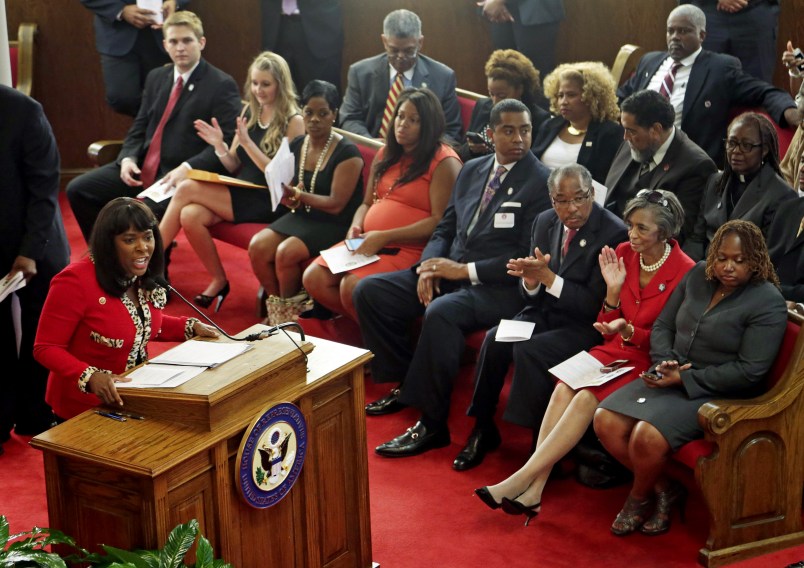WASHINGTON (AP) — The Supreme Court said Monday it will consider a challenge from Alabama Democrats who say a Republican-drawn legislative map intentionally packs black Democrats into a few voting districts, giving them too little influence in the Legislature.
The justices agreed to hear a pair of appeals from the Alabama Legislative Black Caucus and other Democratic lawmakers who contend the new map created in 2012 illegally limits black voting strength and makes it harder to elect Democrats outside the majority-black districts.
A panel of three federal judges had ruled 2-1 last year that the new districts were not discriminatory and did not violate the Voting Rights Act or the Constitution.
The Legislature had to redraw political boundaries to reflect population shifts in the 2010 Census. AlabamaRepublican Attorney General Luther Strange has said the new legislative districts are consistent with federal law.
Democrats contend the new districts were gerrymandered to dilute black voting strength. Despite demographic shifts, they say the map contains the same number of districts with majority black populations that were in a legislative redistricting plan produced a decade ago, when Democrats still controlled the Legislature. The plan has eight of the 35 Senate districts and 28 of the 105 House districts with a majority of black residents.
The three-judge panel rejected the claim about diluting black voter strength. In the majority decision, U.S. Circuit Judge Bill Pryor wrote that “the overwhelming evidence in the record suggests that black voters will have an equal opportunity to participate in the political process the same as everyone else.” He was joined by U.S. District Judge Keith Watkins.
The lone black judge on the panel, U.S. District Judge Myron Thompson, dissented.
Alabama Republicans had similarly challenged the districts drawn by the Legislature’s then-Democratic majority after the 2000 Census, but they also lost. Republicans gained control of the Legislature in the 2010 election.
The cases are Alabama Legislative Black Caucus v. State of Alabama, 13-895, and Alabama Democratic Conference v. Alabama, 13-1138.
___
Follow Sam Hananel on Twitter at http://twitter.com/SamHananelAP
Copyright 2014 The Associated Press. All rights reserved. This material may not be published, broadcast, rewritten or redistributed.







Of course the Supreme Corporate Court, SCOTUS Inc., chose to hear the challenge.
The Flatulent Five know they can stand together to gut another piece of voting rights.
Furthermore, since I know he’ll show up and spread manure, fuck you DugFmJamul.
Gee, I wonder if Clarence will sit quietly and let the white conservatives on the SCOTUS deny members of his race justice. Any wagers?
I have my doubts that Clarence identifies as African American.
You are right, by his own statements. He’s black when he wants to complain that whites are demeaning blacks by helping them out, but entirely white in his point of view that it’s white men on top that he identifies his interests with.
At first, I recoiled against the acronym SCOTUS, thinking it sounds too much like an unclean body part. But with every decision lately, the sound of it rings a little truer.